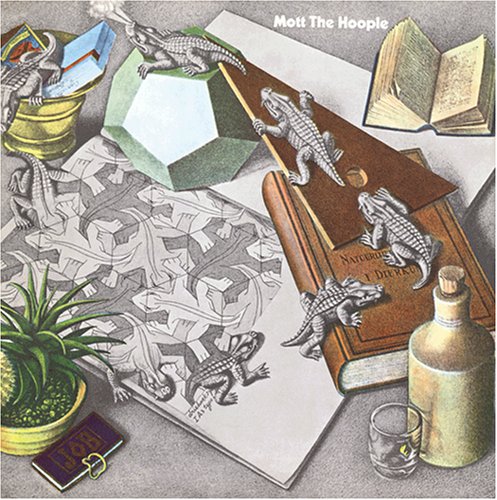As debut albums go, Mott the Hoople’s self titled effort is an enthusiastic display of aspiration, even if it does ultimately fall short of being an all out success. Kicking off with an instrumental cover of The Kinks’ “You Really Got Me” which gives an impression of the crackling energy levels that the band routinely delivered during their live shows, Mott the Hoople is the sound of a band making their grab for long yearned for success, without having actually settled on a coherent identity. From Bob Dylan-esque numbers, to ballads, to heads-down rockers, to Sonny Bono covers, Mott the Hoople is an album where it sounds like every half-baked idea was thrown at a wall to surprisingly potent effect. Were the band the finished article at this stage in their career? Far from it, but they were hell-bent on making their hard-fought for shot at fame count.
In these early days, Mott the Hoople were prepared to shapeshift into whatever type of band would sell enough records to pay the bills, lending their debut album a slightly incoherent sound. Don’t forget though, that this was a five piece so determined to make their mark that they pushed a Hammond organ up multiple flights of stairs to audition in Guy Stevens’ office in Island Records. Stevens’ who would later go on to fame / notoriety for producing no less a landmark album than Mott the Hoople acolytes’ The Clash’s London Calling, was a bit of a live wire in the late 60s, but he was determined to sign a band who put the effort in pushing that Hammond organ up that staircase.
There’s an argument to be made that Stevens was as vital in shaping Mott the Hoople as the five band members were. After all, it was Stevens who insisted that they replace Stan Tippins with a new vocalist, resulting in Tippins being replaced by the instantly recognisable, if somewhat idiosyncratic, vocal stylings of Ian Hunter, a jobbing musician who had been trying to get his big break since the late 50s. Tippins would gamely stay on as the band’s road manager and occasional backing vocalist, thus proving himself to be one of the most selfless individuals in the history of rock and roll. It was also Stevens that was leading on the marketing, and had insisted on their unusual name. Hence the band formerly known as Silence became Mott the Hoople, and they found themselves as Stevens’ pet-project, at least for the first few years of their career.
For all that Stevens tried to mould Mott the Hoople, there were some things that the band did get their own way, or individual members of the band at least. Despite being the new boy, Hunter successfully lobbied to cover Sonny Bono’s “Laugh at Me”, which is one of the highlights of the album, and remains a regular addition to Hunter’s live sets to this day. Another highlight is guitarist Mick Ralphs’ “Rock and Roll Queen”, the debut album’s absolute standout moment, and an early hint at the fact that, at moments, Mott the Hoople could stand shoulder to shoulder with the very best rock acts of the late 60s and early 70s. Despite being somewhat marginalised once the band finally enjoyed commercial success a few years later, Ralphs was co-bandleader during Mott’s early days, and penned some of their most enduring material. Anyone who argues that Ian Hunter was the only reason the band were a success is overlooking Ralphs’ immense contribution, and majorly downplaying his potency as a guitar player. The rest of the band were not to be dismissed either, as Overend Watts and Dale Griffin made for a potent rhythm section, and it was Verden Allen’s hammond organ that had needed pushing up those stairs to Guy Steven’s office in order to get signed.
Despite the knockabout enthusiasm and diversity of this debut album, at the end of the day, you can’t escape the fact that it is an uneven listening experience, particularly when you get into it’s second half, with the elongated “Half Moon Bay” taking up most of the second side of vinyl, and the utterly forgettable “Rabbit Foot and Toby Time”. The album closes with “Wrath and Wroll”, a short thrash of an instrumental which serves as a nice bookend to the opening cover of “You Really Got Me”.
Mott the Hoople would go on to record better albums than their debut, but this is the one that saw them get out of the gate and it laid the groundwork for a fascinating career. Guy Stevens would continue to be their on again / off again producer for the rest of their duration on Island records, Hunter would develop and flourish as a song writer and Mott the Hoople would earn a reputation for being a fan friendly act of unforgettable live potency. This was just the beginning.














No Comment